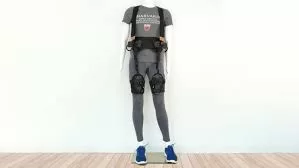
In a groundbreaking stride toward addressing the challenges posed by Parkinson’s disease, researchers from Harvard and Boston University have introduced a soft, wearable robot designed to assist individuals living with Parkinson’s in overcoming freezing episodes.
Parkinson’s disease, a neurodegenerative disorder impacting over nine million people globally, often presents symptoms that include freezing—where individuals suddenly lose the ability to move their feet, leading to abrupt halting mid-stride.
The study, documented in the journal Nature Medicine, showcased the innovative robotic garment, worn around the hips and thighs, which provides a gentle push to the hips as the leg swings, enabling the patient to achieve a more extended stride.
Conor Walsh, co-corresponding author of the study, emphasized the profound impact of the device: “Just a small amount of mechanical assistance from our soft robotic apparel delivered instantaneous effects and consistently improved walking across a range of conditions for the individual in our study.”
Over a six-month period, researchers collaborated with a 73-year-old man battling Parkinson’s disease, who faced frequent and incapacitating freezing episodes despite undergoing surgical and pharmacologic treatments. These episodes, occurring more than ten times daily, often led to falls.
Following the usage of the device, the patient exhibited remarkable improvements. He could walk indoors without any freezing episodes and experienced only occasional instances outdoors. Furthermore, he managed to walk and converse seamlessly—a challenge he typically faced without the aid of the device.
Expressing his experience with the suit, the participant conveyed, “The suit helps me take longer steps, and when it is not active, I notice I drag my feet much more. It has really helped me, and I feel it is a positive step forward. It could help me to walk longer and maintain the quality of my life.”
Beyond its immediate impact, researchers highlighted the potential of the device in unraveling the enigmatic mechanisms underlying gait freezing, a phenomenon still relatively obscure in medical understanding.
The development of this soft robotic garment represents a significant stride toward improving mobility and quality of life for individuals affected by Parkinson’s disease, offering hope for enhanced mobility and further insights into the condition’s complex nature.











